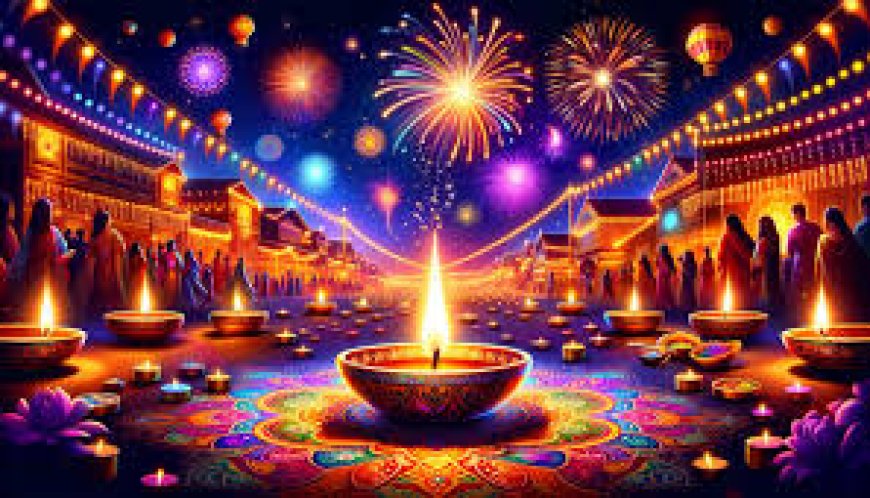Diwali 2024: India Prepares for the Festival of Lights
Diwali 2024 is set to be a vibrant celebration, bringing people together from all walks of life. This festival, known for its lights, colors, and joy, goes beyond religious and cultural boundaries, spreading a message of hope, unity, and the eternal victory of light over darkness.

Diwali, also known as Deepawali or Deepavali, is one of the most widely celebrated festivals in India, bringing together millions of people in a grand celebration of light, joy, and togetherness. Known as the "Festival of Lights," Diwali symbolizes the victory of good over evil and light over darkness. The festival is eagerly awaited every year, as it marks a time for families and communities to come together in celebration.
What is Diwali and Why is it Celebrated?
The word "Diwali" comes from the Sanskrit term "Deepavali," which translates to "row of lights." This festival is deeply rooted in Hindu mythology and traditions. One of the most popular stories associated with Diwali is the return of Lord Rama to his kingdom of Ayodhya after 14 years in exile and his victory over the demon king Ravana. The people of Ayodhya lit oil lamps, called diyas, to celebrate his return, symbolizing the triumph of light over darkness and good over evil.
Diwali is more than just a religious event—it represents new beginnings, prosperity, and the renewal of life. Many people see it as an ideal time to start new ventures, buy new items, and spread joy and goodwill among family and friends.
When is Diwali 2024?
In 2024, Diwali will be celebrated on October 31st, a Thursday. The date of Diwali varies each year as it is determined by the Hindu lunisolar calendar, which is based on the cycles of the moon and the sun. It usually falls between mid-September and mid-November in the Gregorian calendar.
Diwali is celebrated over five days, each with its own unique significance:
-
Dhanteras: The festival begins with Dhanteras, a day dedicated to wealth and prosperity. On this day, people clean and decorate their homes and buy new items like gold, silver, or kitchenware, which are believed to bring good fortune.
-
Choti Diwali (Naraka Chaturdashi): The second day, known as Choti Diwali or Naraka Chaturdashi, commemorates Lord Krishna's victory over the demon Narakasura. People celebrate by lighting lamps, bursting firecrackers, and preparing special sweets.
-
Diwali (Lakshmi Puja): The third day is the main day of Diwali, marked by Lakshmi Puja, where people pray to Goddess Lakshmi, the goddess of wealth and prosperity. Homes are illuminated with oil lamps and colorful rangoli designs, and families exchange gifts and sweets.
-
Govardhan Puja (Padwa): The fourth day, Govardhan Puja or Padwa, celebrates Lord Krishna's victory over Indra, the god of rain and thunder. It is marked by prayers, feasts, and preparing large quantities of food to offer in thanksgiving.
-
Bhai Dooj: The final day of Diwali is Bhai Dooj, a celebration of the bond between brothers and sisters. Sisters perform rituals for their brothers' safety and well-being, and brothers, in turn, give gifts to their sisters.
Diwali Celebrations Across India
Diwali is celebrated with great enthusiasm across India, but the ways of celebration differ from region to region. In northern India, cities and towns glow with the light of diyas and colorful decorations. The skies are filled with fireworks, and the streets are alive with the sound of firecrackers and the aroma of delicious sweets.
In western India, especially in states like Gujarat and Maharashtra, Diwali marks the start of the new financial year. People perform special rituals to seek blessings for prosperity in their businesses. In West Bengal and other parts of eastern India, Diwali coincides with Kali Puja, where people worship Goddess Kali. In southern India, known as Deepavali, the traditions may vary, but the core idea of celebrating light, joy, and unity remains the same.
Key Traditions and Activities During Diwali
The celebration of Diwali is marked by several traditions and activities that add to its charm:
-
Lighting Diyas and Creating Rangoli: Homes are decorated with earthen oil lamps (diyas) and colorful rangoli patterns at the entrance to welcome positivity and keep away evil.
-
Fireworks and Firecrackers: Firecrackers are an essential part of Diwali celebrations, believed to ward off evil spirits and bring joy to all.
-
Exchanging Sweets and Gifts: It is a common tradition to exchange sweets, dry fruits, and gifts with family, friends, and neighbors, strengthening bonds and sharing happiness.
-
Wearing New Clothes: People wear new, colorful clothes on Diwali, symbolizing freshness, renewal, and the festive spirit.
-
Feasts and Special Dishes: Diwali is also a time for feasting. Families come together to prepare and enjoy special dishes and sweets like laddus, barfis, and jalebis.
Conclusion
Diwali 2024 is set to be a vibrant celebration, bringing people together from all walks of life. This festival, known for its lights, colors, and joy, goes beyond religious and cultural boundaries, spreading a message of hope, unity, and the eternal victory of light over darkness. Whether it is through lighting a lamp, bursting a firecracker, or sharing a meal with loved ones, Diwali continues to be a powerful reminder of the triumph of good over evil and the importance of spreading light and happiness in the world.
Read Also
1) Hindu Temple
What's Your Reaction?



























